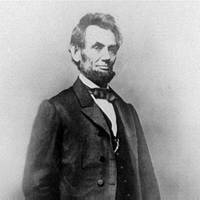
 |
Abraham Lincoln's early life typified experiences shared by millions of northerners. Lincoln's family moved west from Kentucky to Indiana in 1816, partly, he later said, "on account of slavery." In 1830 Lincoln moved further west, settling in New Salem, Illinois, where he worked as a general store clerk. Two years later he volunteered for the Illinois militia in the Black Hawk War, but saw no action. Like many ambitious men in the 1830s, Lincoln entered politics. He served as a Whig member of the Illinois legislature (1834-42), campaigned actively for his party's presidential candidates, and won a single term in Congress in 1846. |
Brady National Photographic Art Gallery (Washington, D.C.), photographer. "Abraham Lincoln, three-quarter length portrait, standing, facing left." 1864 January 8. Selected Civil War Photographs, 1861-1865, Library of Congress. |
After leaving office in 1848, Lincoln earned his livelihood from an increasingly successful law practice. By the 1850s, the self-educated Lincoln was one of Illinois's most prominent attorneys. He represented, among other clients, the powerful Illinois Central Railroad. |
Lincoln believed his life exemplified the virtues of the North's free labor system. In the South, laborers were "fatally fixed in that condition of life," but in the North, he declared, opportunities for "advancement, improvement in condition," and economic independence existed for everyone.
